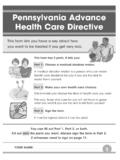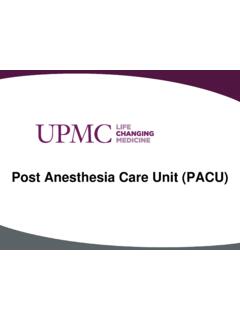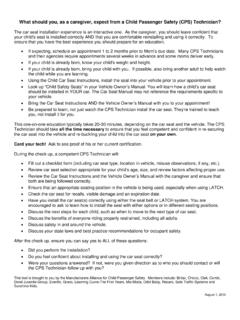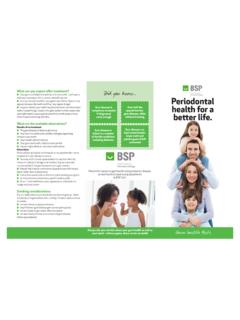Transcription of WHAT TO EXPECT: POST-ANESTHESIA CARE UNIT
1 what TO expect : POST-ANESTHESIA care unit 1 POST-ANESTHESIA care UNITA fter receiving anesthesia for a surgery or procedure, a patient is sent to the PACU to recover and wake up. The PACU is a critical care unit where the patient s vital signs are closely observed, pain management begins, and fluids are given. The nursing staff is skilled in recognizing and managing problems in patients after receiving anesthesia . The PACU is under the direction of the Department of PACU PATIENT EXPERIENCEP atients are admitted to the PACU immediately after to expect : You will have monitors attached to you that take your vital signs every 5 to 15 minutes, unless your condition requires more attention.
2 You may have an oxygen mask or nose prongs to help you breathe, as necessary. Your surgical site will be examined. Intravenous fluids will be checked. A report will be taken by the anesthesia provider and the operating room nurse. This information is required in order to plan your Welcome to the POST-ANESTHESIA care unit (PACU). We are dedicated to providing the highest level of care to our patients. The goal of this guide is to give you a better understanding of the PACU. Through each step, we will try to clearly explain every aspect of care . Let this information be your guide as you wait for your loved one to recover after After Surgery: It is common to experience a sore throat, aching muscles, or a feeling of being ill for up to 24 hours.
3 You may experience shivering following surgery. Your PACU nurse will provide warmed blankets and, if necessary, a special blanket that circulates warm air. If shivering is extreme, you will be given medication. Nausea and vomiting may occur. If you have a history of motion sickness or nausea and vomiting following anesthesia , it is important to inform the anesthesiologist prior to surgery. It may be possi-ble to give you medication before or during surgery to decrease the likelihood of this occurring. If you experience nausea or vomiting in the PACU, your nurse will administer medication through your IV line to alleviate your discomfort.
4 Pain is common after surgery. It is important that you describe exactly how much pain you are feel-ing on a scale of zero to 10. Zero means no pain and 10 means the worst pain you can imagine. Based on your level of pain, we will give you pain medication to make you feel more , IPads, and LaptopsIf you are awake and comfortable, we have radios, iPads, and laptops you can use for listening to music, watching television or videos, playing computer games, checking emails, and surfing the Web. You also may let your nurse know if you would like to use an iPad to talk remotely with a family member or loved one who may be waiting to see how you are of StayEvery patient s length of stay in the PACU is different, but on average it is usually one to three hours.
5 This depends on factors such as type of surgery, the patient s response to surgery and anesthesia , and medical history. Most patients remember very little regarding their recovery room a patient has to stay longer than expected, family needn t worry. A longer stay may be necessary to ensure that the patient receives the best care possible and that they are comfortable before being on their type of surgery or procedure, a patient is discharged from the PACU to an appropriate inpatient room (for an extended stay), or back to the Day of Surgery unit (before discharge home). This decision is based on several conditions: Recovery from anesthesia : >For general anesthesia , the patient should be awake and returned to a normal mental state.
6 >For spinal anesthesia , the patient must be able to feel and move their legs the way they could before surgery. Vital signs need to be stable. Depending on the surgery and type of anesthesia , a patient may require medicines that help control heart rate, blood pressure, respiration, or disorders such as diabetes, which may require a longer stay in the PACU. Pain should be under control and manageable. If a patient is experiencing severe nausea or vomit-ing, a longer stay in the PACU is necessary. Baseline temperature must be normal. Excessive shivering and loss of body heat due to anesthesia may require a longer stay in the all of the discharge criteria are met, a patient is discharged by their anesthesiologist to an inpatient room or to the Day of Surgery unit (if you are going home).
7 Room AssignmentsPatients who are staying at the hospital will be assigned a room as soon as one is available. Although surgery is prescheduled in most cases, rooms are not assigned until the patient is ready to leave the PACU and a room is available. Often patients and families may request a private room. While we understand a patient s desire to have a private room, many considerations must go into the placement of patients in rooms, such as gender, surgical specialties, infections, and hospital census. We try to honor requests for private rooms, but if we are unable to do so we want to assure you the patient s care will not be AND VISITOR INFORMATIONIn the Surgical Family LoungeIn the Surgical Family Lounge you are welcome to watch television, use your cell phone, enjoy coffee, use the computers, or bring in food from the cafeteria or elsewhere.
8 If you do not have a cell phone, family and friends may call you on the Surgical Family Lounge telephone at 412-623-3620. Keep in mind that our doctors and nurses call in on these phones to speak with patients families. Please keep personal calls on these phones very is very important to assign a family member or friend to stay in the Surgical Family Lounge until the surgeon calls or comes down after surgery. It also is important to identify one person to communicate with the surgeon, and the Operating Room and PACU staff. When entering or leaving the Surgical Family Lounge please advise one of our staff greeters, and if possible, give the greeter a phone number where we can reach you.
9 Please talk to a greeter if you have any questions or concerns. They are trained to assist you while your loved one is in surgery or the PACU. The Surgical Family Lounge is staffed Monday through Friday, from 4:30 to 8:30 SurgeryYour surgeon most likely informed you of approximately how long surgery will take. However, start times for surgery are sometimes delayed for many reasons. Operating Room staff may call family or loved ones in the Surgical Family Lounge if there have been delays. If the surgery has lasted longer than expected and you have not received news, you may ask a greeter to contact the Operating Room for an Communication Tracking BoardA communication board is located in the lounge that tracks your loved one s location throughout the surgical process.
10 The staff in the Surgical Family Lounge can help with any questions you might have regarding the tracking With the DoctorYour loved one s surgeon will reach out to you after the surgery or procedure is complete. However, some do it differently than others: Some call the Surgical Family Lounge by phone. Some come to the Surgical Family Lounge to speak in person. Some do not call immediately after surgery, but wait until they have finished several the surgeon has spoken with you, you may leave the Surgical Family Lounge. Before you leave, give the greeter a phone number where you can be the PACUWe know you are anxious to see your loved one after surgery.
















